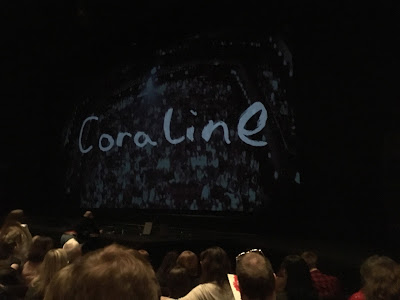I saw Bizet's Carmen a couple of weekends ago, in a production by the ENO at the London Coliseum. I have had mixed feelings about the previous operas I have seen - I like the music, but find it much harder to suspend my disbelief and get immersed in the show than I do with straight theatre.
I enjoyed Carmen - maybe because so much of the music is familiar, but it has to be admitted that having it sung in English, and therefore wholly understandable, does rather expose the er.. somewhat thin plot.
The story, as far as I could make out, is along these lines:
- Soldiers are doing soldiery things like parading around on guard duty and ogling passing women. A good, well-brought up young woman comes looking for a soldier, José, she brings a letter from his mother and there is some very loud musical flirting based on her bringing kisses from his mother..
- She leaves, and a lot of girls from the cigarette factory come out to take a break and flirt with the soldiers, with Carmen singing about how she doesn't love anyone who might love her, and giving José a flower., before going back to work.
- A fight breaks out in the factory and Carmen is accused of knifing another woman - at which point we learn that the army apparently doubles at being the police force, and that they are not believers in any kind of investigative process. For no obvious reason, rather than taking Carmen immediately to prison, she is instead to be tied up, first.
- This provides the opportunity for Carmen to manage the fastest seduction in history, plotting (very musically and at the top of her voice) with José, to suggest that he should allow her to escape. José, being clearly very susceptible (and presumably sex-starved) instantly succumbs, and agrees to let her escape by ... er.. giving him a shove and running away.
- Carmen duly runs away (there appears to be a rule that if she makes it off stage, she's free and no-one is allowed to chase her any further), and José is arrested and sent to prison for 3 months for letting her get away (his superior officer having found him out, possibly through having overheard Carmen laying out her plan in detail, and possibly due to the inherent improbability of a young cigarette girl managing to break out of her bonds and escape from a heavily armed soldier.
- We are now half way through.At the start of the second half, Carmen, along with some other gypsy women, is dancing in a nightclub. The patrons mostly seem to be soldiers, including the on who ordered her arrest, (who appears not to recognise his fugitive, possibly because she is wearing a different frock). In this production, the nightclub is a car, instead. Much flirty dancing ensues.
- A passing toreador, Escamillo, arrives at the club, mostly as an excuse for the splendid Toreador song, which doesn't really need any excuse!
- José gets out of prison and shows up at the cafe / nightclub / car where Carmen makes him very welcome. However, all is not good - the bugles ring out from the barracks, and Jose must return to do his duty. But, sings Carmen, she loves him and wants him and he should stay..
- Despite the fact that the last time he listed to Carmen's plans, he wound up with 3 months in prison,José allows his libido to overcome his judgment once again,and decides to stay with Carmen rather than returning to barracks. For no very obvious reason, Carmen's gypsy friends also kidnap José's boss.
- Time passes. There is some singing. We learn that Carmen and the gypsys are involved in smuggling. There is some singing about how they are excellent smugglers, how women are useful to distract the guards and how smuggling is very dangerous. It does not appear to occur to anyone that a loud choral exposition about their smuggling plans might be a bad idea.
- While waiting for their smuggling plans to mature, Jose's original girlfriend (remember her? With the letter, from the first act?) turns up looking for José. He is unimpressed by her skill and determination in tracking him down and her committment to getting his other's letter to him, despite his being somewhat unsatisfactory track record as a boyfriend so far. Carmen and her friends so a spot of tarot and find that Carmen is doomed! The is Death in cards, no matter how often you deal them.
- Escamillo, the toreador, also shows up. He has the hots for Carmen, but being a sophisticated metrosexual type of chap is unfazed by the fact that she has a lover, points out that she also has a low boredom threashold and will be over him in a few months. José is less relaxed about things, and starts a fight with Escamillo. He fails to kill him, and Escamillo leaves, inviting everyone to his next bull fight.Because just because someone just tried to stab you death is apparently no reason not to put them on the guest list.
- We then go to the bull fight. There is much rousing singing about how brave and daring he bullfighters are, how great everyone looks, and how amazingly awesome Escamillo is. Carmen has got a bit bored of José by this point and enters on Escamillo's arm, enjoying the limelight. Jose shows up, and they have a fight, which mostly consists of José making it clear that he loves Carmen and no-one but him can have her, and Carmen telling him she isn't interested. And then he kills her.Which rather dampens the mood.
Despite the downbeat ending, it was entertaining, and I enjoyed it more than the other operas I've seen - I am glad I went. Although I am still not convinced that setting it in the 70s really worked.





